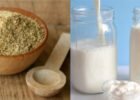Veggie lovers may have had it right from the beginning. While crude, natural milk offers various medical advantages, a Harvard specialist and pediatrician contends that customary milk and dairy items are a burden to your well-being – thanks to added health-compromising sweeteners.
Also, the United States Department of Agriculture, the American Academy of Pediatrics, and different associations are suggesting against caloric intake from sugary beverages.
The one calorie-containing refreshment they still intensely advance, on the other hand, is low-fat milk, where the association prescribes drinking 3 glasses a day. Ludwig questions the logical reason for such proposals.
“This recommendation to drink three cups a day of milk is perhaps the most prevailing advice given to the American public about diet in the last half century. As a result, Americans are consuming billions of gallons of milk a year, presumably under the assumption that their bones would crumble without them,” says David Ludwig.
If the USDA is prescribing drinking milk, it is inadvertently empowering the use of included sugars – a suggestion that goes against all the studies saying not to. The studies usually focus on sugary drinks — sodas, artificially sweetened juices — but rarely discuss low-fat milk.
The thought of drinking low-fat milk or chocolate milk counteracts the entire thinking for the proposal. The fats are essentially being supplanted with hazardous sugars.
“The worst possible situation is reduced-fat chocolate milk: you take out the fat, it’s less tasty. So to get kids to drink 3 cups a day, you get this sugar-sweetened beverage,” Ludwig says. ”…we can get plenty of calcium from a whole range of foods. On a gram for gram basis, cooked kale has more calcium than milk. Sardines, nuts seeds beans, green leafy vegetables are all sources of calcium.”
The Case Against Low-Fat Dairy, and The Other Dangers of Milk
Harvard analyst David Ludwig really has a point in eventually condemning the USDA’s proposals, yet there is substantially more to the full-fat versus low-fat milk debate.
There is a lot of motivation to maintain a strategic distance from specific fats, for example, trans-fats and refined polyunsaturated fats in vegetable oils (like corn, soy, sunflower, and canola), yet the proof for the moderate use of immersed fat — found in milk, coconut oil, and grass-nourished creatures — is rising up to the top.
While immersed fat was reviled for a considerable length of time, a 2010 examination distributed in the American Journal of Clinical Nutrition reasoned that “there is no significant evidence for concluding that dietary saturated fat is associated with an increased risk of [coronary heart disease or cardiovascular disease].”
Further, there are various advantages to drinking full-fat dairy items. In its most unadulterated state (crude, natural, and originating from grass-fed dairy animals), full-fat dairy has been found to advance heart health, control diabetes, help in vitamin ingestion, lower risk of disease, and even support in weight reduction.
Remember this though: immaculate dairy could advance your well-being, but customary dairy may still be harming you.
Learn more about your dairy before you put it in your body. You’d be astonished that there could be 20+ painkillers, anti-toxins, and other harmful material floating in your milk.
Source: www.realfarmacy.com




